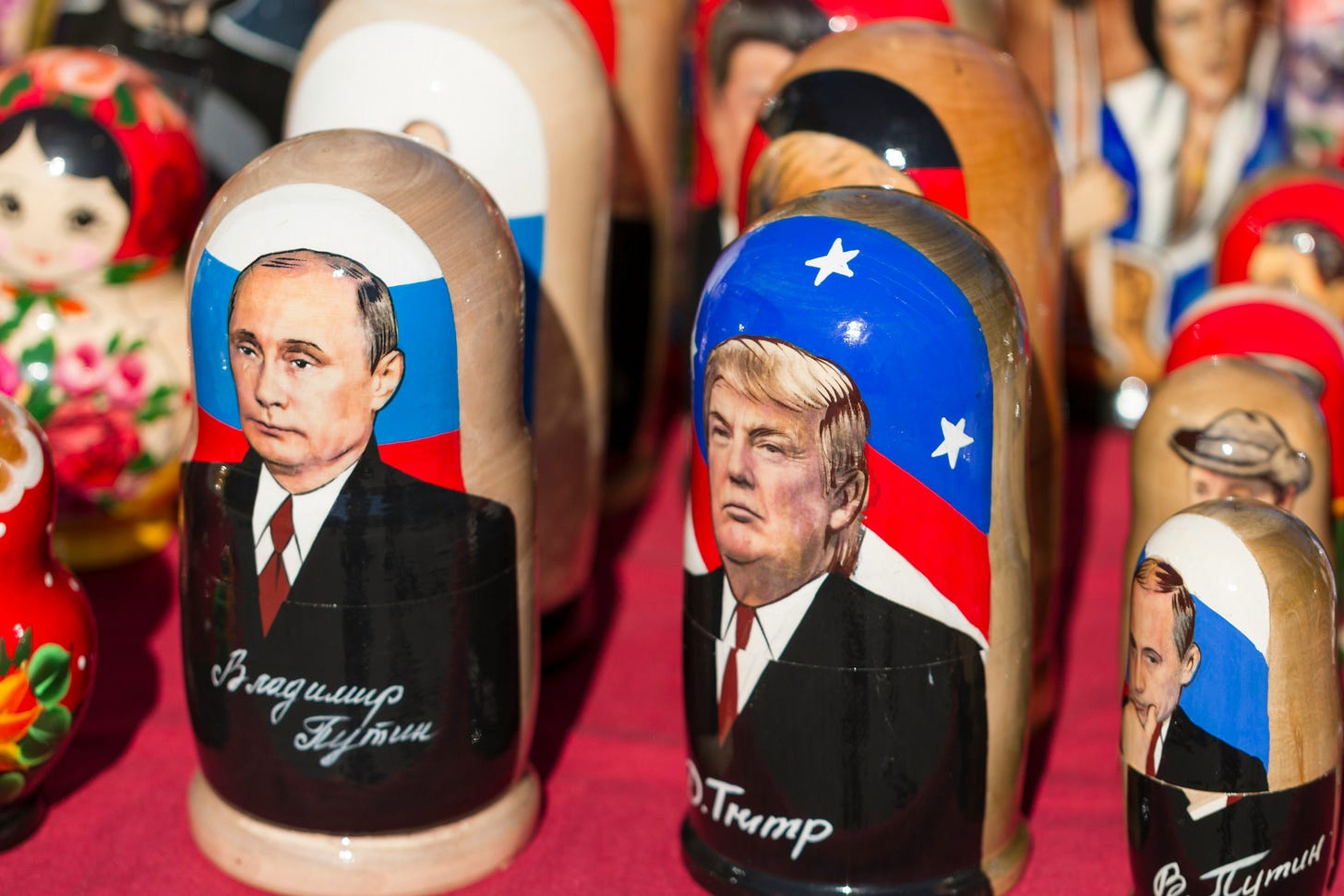Our Best Enemies: On Russia, America, and Imperial Provincialism
The United States is growing increasingly similar to Russia, but some of the similarities have been there for a long time
Welcome back, longtime bugbears and new readers alike! Those of you who have read me for years may be aware that my first trips to Russia, in 1999 and 2000, were short-term evangelical youth mission trips. This is an embarrassing part of my history that I rarely talk about, but if you want all the cringeworthy deets, you’ll find them in my essay contribution to my 2019 coedited collection of personal essays, Empty the Pews: Stories of Leaving the Church. There are a number of wonderful essays in that book, including a brilliant one by my coeditor Lauren O’Neal unpacking the many uncomfortable parallels between Christianity and diet culture.
Speaking of uncomfortable parallels, I find that many liberal Americans balk at the statement that Russians and Americans have a great deal in common, most of it not good. The statement is true, however. Both the Russian Federation and the United States have vast swaths of undergoverned rural territory and sizable populations of conspiracy theorists prone to jingoism. Both do poorly in foreign language education, both have major issues with violence against women. Russia has more or less always been a low-trust society, and American society is increasingly low-trust. Both countries have experienced an identity crisis since the end of the Cold War.
As the United States under Donald Trump is currently transforming into kleptocratic autocracy much like Russia under Vladimir Putin, now is the time to face these realities. I’ve been documenting these similarities and the affinity for Russia among right-wing Americans for years, and at the end of today’s essays you’ll find links to my relevant writing. In the meantime, I’ll take you on a little tour of some of the time I’ve spent in Russia—mostly, and this is salient, the time I’ve spent outside Moscow and St. Petersburg, although one certainly encounters xenophobia, bigotry, conspiracy theories, and imperial provincialism in the Russian capitals as well.
Sometimes they speak directly to the affinity between conspiratorial, right-wing Russians and their American counterparts, like for example in the Confederate battle flags—on bumper stickers, in windows—you’ll come across if you spend much time in Moscow. I suppose I may have only seen five or six, walking through the same parts of the same neighborhoods multiple times when I lived in Moscow from 2012 to 2015. But even if that’s the case, it’s bizarre—the ideal number of Confederate displays to come across in a foreign country or, well, anywhere, is of course zero!
Area Studies Adventures and Observations on Russian-American Similarity
In the summer of 2005, after my first year of grad school, I returned to Vladimir, Russia—a provincial city about 120 miles northeast of Moscow—where I had taught English at an institution called the American home from 2003-2004. Now a PhD student in modern Russian history at Stanford, I was back for the American Home’s intensive Russian program, continuing to work with the same tutor I’d studied under for free as one of the benefits of my teaching job with the AH.
Even during the Cold War, Russian/Soviet and American styles of patriotism mirrored each other in their boorish and cartoonish nature.
One day that summer, I returned to my host mother’s apartment only to find her on again, off again, alcoholic live-in boyfriend Andrei sitting at the kitchen table with a militia officer. (At that time, the Russian police were still referred to as the militia, though in 2011 they were officially designated police.)
As I opened the door and strode into the hall, preparing to take off my shoes, I heard Andrei say to the officer, whose presence I was only just noticing, “Ah, here comes our American.” For his part, the officer sighed and dramatically replied, in a deeply nostalgic tone, “An American? Our best enemies!”

Why is there a militia officer at the kitchen table? I thought to myself. Am I in trouble? While I didn’t think I had done anything to get myself in trouble, some days prior I may or may not have shouted “Down with Yanukovych” in the street, in Russian, when Ukraine’s then recent Orange Revolution came up in conversation with a new friend. This friend reacted—sensibly, in retrospect—by shushing me.
Andrei immediately objected to his militia friend’s “best enemies” comment. “Nyeeeet, they’re not our enemies anymore,” the skinny drunk with permanently messy brown hair insisted. “It’s the Chinese!” Looking at me and the tall, classically handsome officer in turn, he added, “They’re your enemy, and they’re our enemy.” As Andrei continued in that jingoistic but America-friendly and Sinophobic vein, I realized both that I was not in trouble and that I was going to be stuck at the kitchen table drinking with these chudaki for an indefinite period before I could get to my homework. Well, to the khui with my homework. The vodka began to flow.
Keep reading with a 7-day free trial
Subscribe to The Bugbear Dispatch to keep reading this post and get 7 days of free access to the full post archives.



